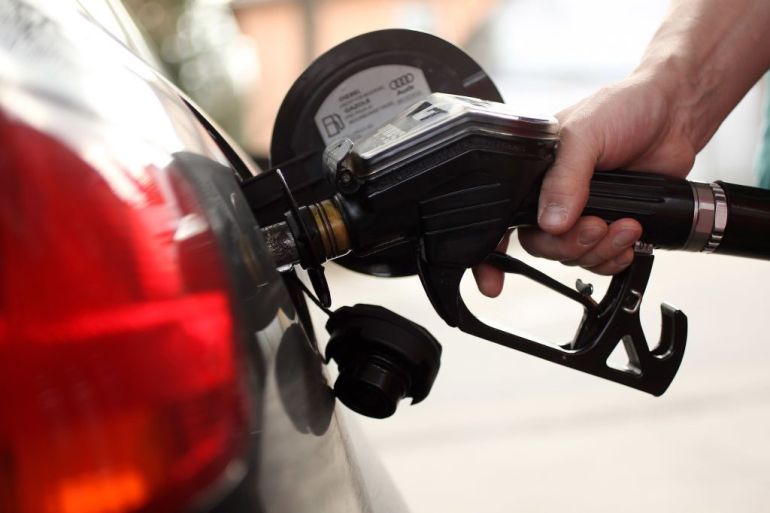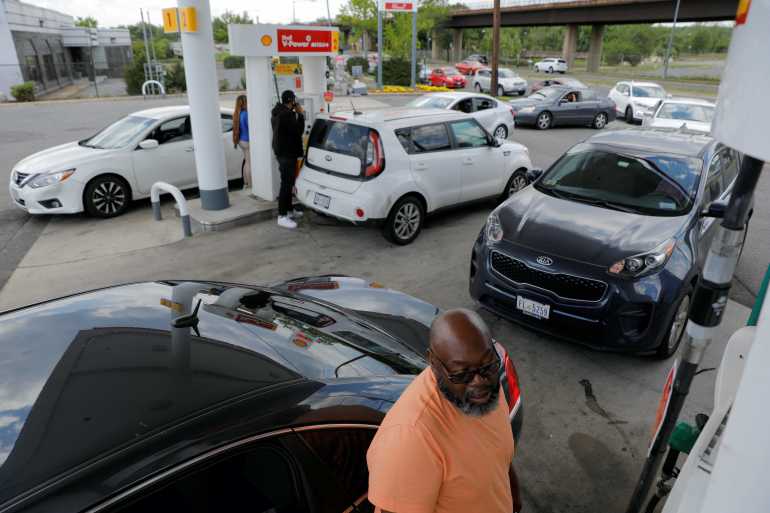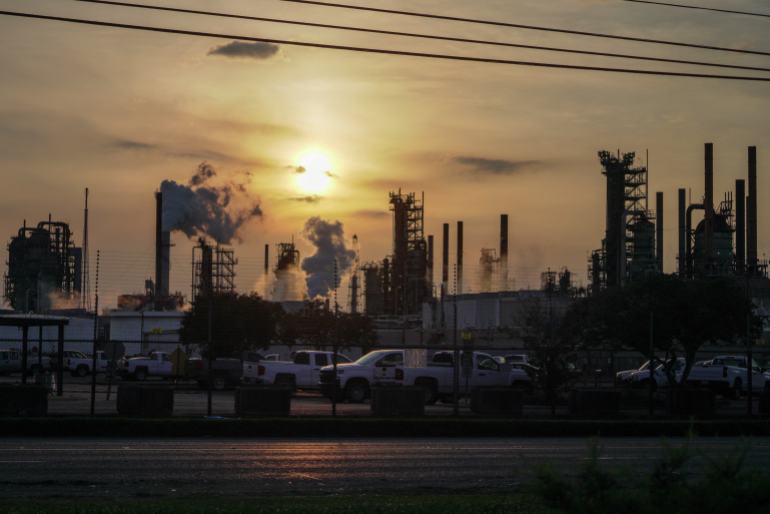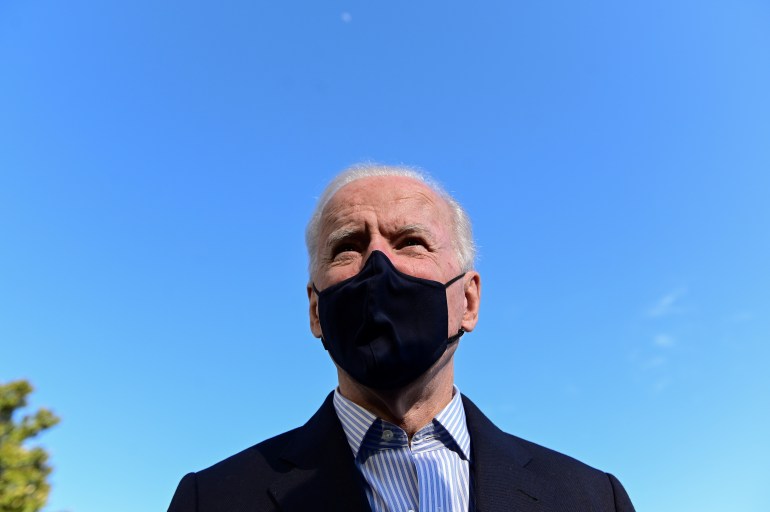Pump pain: What can Biden do to ease soaring gasoline prices?
After being shunned by OPEC+, US President Joe Biden faces growing pressure to rein in prices.

Americans love their cars. But right now, that love affair is becoming a pain in the wallet for millions of consumers in the United States who are shelling out more and more to fill up their cars, trucks and other vehicles at petrol stations.
That pain at the pumps is set to become especially sharp this month and next, with millions of Americans expected to hit the road to spend the holidays with family and friends after choosing to be homebound last year.
Keep reading
list of 4 itemsDespite tight supply, US refiners export most gas in three years
OPEC+ snubs Biden’s plea to pump more oil
Will OPEC+ give Biden what he wants? The market doesn’t think so
US President Joe Biden, like all presidents, is mindful of how higher gasoline prices can make voters discontent with his stewardship of the economy. But his efforts to rein in higher gasoline prices by appealing to the Organization of the Petroleum Exporting Countries (OPEC) and its allies to pump more oil has so far fallen on deaf ears.
So why are petrol prices climbing? How much higher could they go? And what can Biden do to help bring down gasoline prices and make road-bound Americans a little cheerier this holiday season?
Here’s the short answer.
How high are gasoline prices right now?
Gasoline prices in the US vaulted 6.1 percent in October on a monthly basis and nearly 50 percent from the same period a year ago, according to government figures.
Is everyone feeling the pain equally across the US?
No. A gallon of gasoline can cost an average of $4.12 on the West Coast as of November 8, according to the US Energy Information Administration. The cheapest gallon you can buy is in the Gulf Coast for an average of $3.10 but that’s still up $1.35 a gallon compared to last year.
Why is there so much pain at the pumps?
Because global demand for oil is outstripping global supplies right now.
And why is that?
Blame the pandemic. Last year, global crude demand plummeted when countries took measures to curb the spread of COVID-19. This year, as economies have cast aside coronavirus restrictions and vaccination rates have climbed, demand for oil has recovered sharply.
How strong has that recovery been?
Crude prices have surged roughly 60 percent this year. As of Thursday morning, global benchmark Brent crude futures were priced at $83.32 a barrel while US West Texas Intermediate crude futures cost $82.20 a barrel.
Are there any domestic factors driving US petrol prices higher?
Yes. As COVID-19 restrictions have rolled back and more jabs get into more arms, drivers in the US who were hunkered down at home last year and earlier this year have been hitting the road. They are also travelling longer distances and driving more often as they get back to hum-drum activities like driving to the office, dropping off and collecting kids from school, and actually going out to socialise.
“People are driving more, probably because the pandemic is fading or people are getting used to living with the risk of infection,” Jim Krane, energy analyst at Rice University’s Baker Institute, told Al Jazeera.
And beyond driving?
Well, yes. There’s been some serious supply disruptors recently. August’s Hurricane Ida left behind billions of dollars in damage and pummeled Gulf Coast energy suppliers, temporarily knocking out most of the area’s offshore wells and nearly half of its motor fuel output. Last May’s ransomware attack on Colonial Pipeline, which carries nearly half the fuel consumed along the East Coast, halted deliveries to gas stations and left millions without gasoline.
“It’s a bunch of black and grey swans,” Reed Blakemore, deputy director of the Atlantic Council’s Global Energy Center, told Al Jazeera. “Do they affect prices? Yes.”
So what has Biden tried to do to keep a lid on rising petrol prices?
He tried asking OPEC and its allies to start pumping oil more aggressively than they were planning to. Because the more supply that comes on to the market, the more it will fall into line with demand and bring down oil prices – and petrol prices.
How did that work out for him?
Not well. At its latest meeting, OPEC and its buddies rejected Biden’s pleas to open the taps more generously. Instead, they decided to stick with their current plan to gradually cast off the production curbs they put in place last year when oil demand was in the basement.

Why are OPEC and its allies resisting Biden’s calls to pump more?
Analysts say it’s largely because the cartel and other major producers like Russia are okay with waiting and seeing how demand improves. More oil demand means more cash for them. “Biden’s problem is that he is trying to coax oil producers to accept lower profits. It’s a tough sell,” Krane explained.
So what other tricks does Biden have up his sleeve to influence global supply?
Well, some analysts say it’s not as simple as the president waving a magic crude wand or calling Moscow or Riyadh and insisting they pump, pump, pump.
“The US president does not have much control at all over gasoline or oil prices, even inside the United States,” said Krane. “Oil prices are set in a global market.”
Well, there’s gotta be something he can do.
Besides asking nicely, the president has a few diplomatic moves he could make to try and get OPEC on board with pumping more crude. But all of them have trade-offs. This is how Blakemore put it to Al Jazeera:
“Biden can choose to double down on direct diplomacy with major oil producers, namely Saudi Arabia, to put more barrels on the market — though it’s currently unclear where the administration currently has leverage to really twist the arm of Riyadh.”

Anything else to be done on the global front?
Analysts say removing sanctions against Iran would also put more barrels of oil on the market, but that’s a whole other can of worms that comes with geopolitical trade-offs and broader negotiations around the Iran nuclear deal.
Is there anything Biden can do domestically to lower petrol prices?
Biden could order a release of oil from the SPR.
What’s the SPR?
The Strategic Petroleum Reserve (SPR). It’s effectively an oil storage capacity the US government controls. It is there to be used when the market poses a risk to national security. That could include a supply crunch.
So if he taps the SPR, is that problem solved?
Analysts say it really would be a short-term solution to a bigger issue. Alleviating prices for a time is one thing and would certainly help Americans’ pocketbooks, but that still does not resolve a supply-demand imbalance that can last for months and is likely to get worse during the winter months.

But if tapping the SPR lowers gasoline prices, where is the downside?
Not all analysts think tapping the SPR is a good move. Especially when viewed through the prism of Biden’s efforts to decarbonise the US economy.
“Americans responded unwisely to falling oil prices since 2014 by buying gargantuan pickup trucks and SUVs,” said Krane. “At some point these folks need to take responsibility for their decisions. Giving them cheap fuel from the SPR looks like a government bailout for bad behaviour.”
What else can Biden do on the home front?
Well US refiners are exporting more petrol than they have in three years. Biden could implement an export ban to help cool domestic prices, but that comes with risks.
Like what?
Like disrupting US oil producers and refiners just as they are finding their footing after facing an existential crisis last year when oil prices crashed.
“A ban would undermine US oil production at the very moment we need it. Oil is the most traded commodity on earth. It sounds ironic but other countries are better suited to process American oil than America is,” Krane told Al Jazeera. “Even considering a ban is counterproductive.”